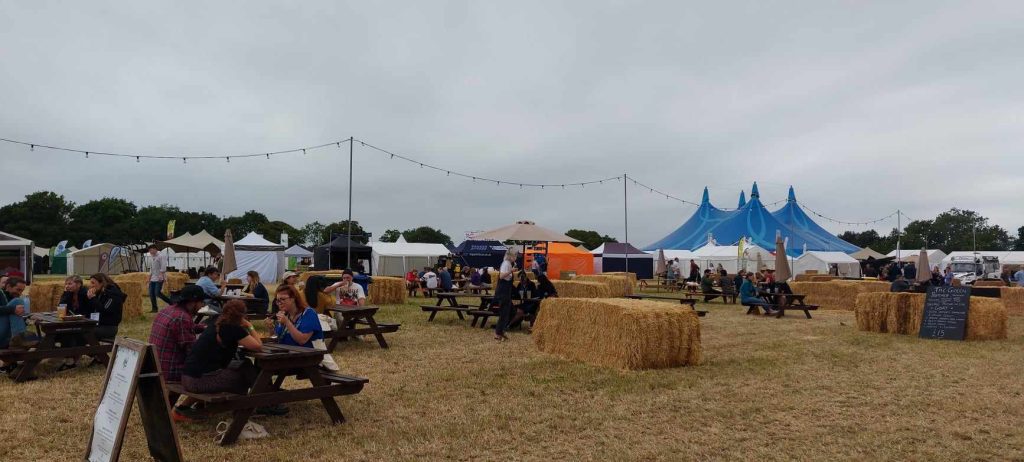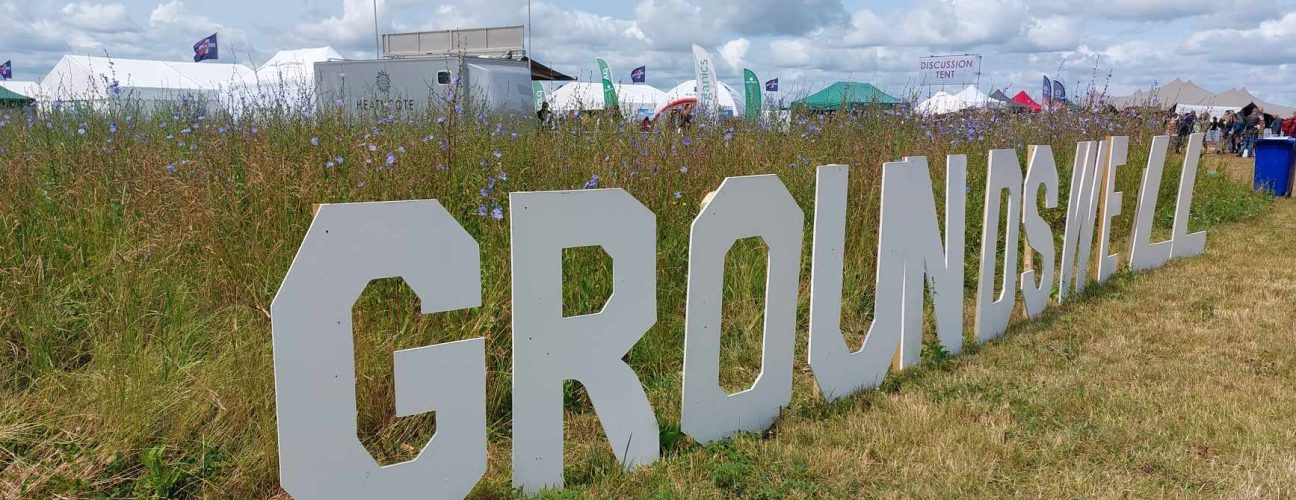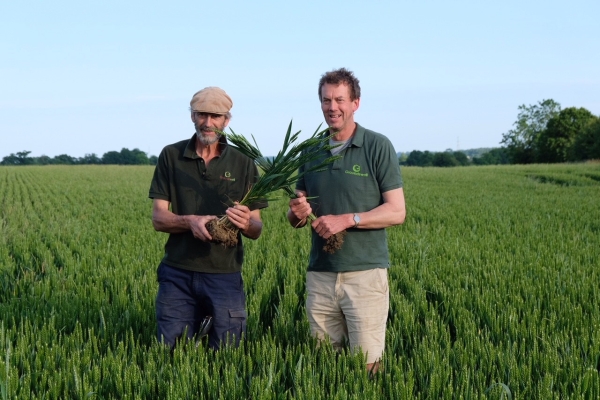Groundswell: Making Regen Ag Pay
Groundswell 2023 did not disappoint – the buzz of stands, workshops, discussions, and of course general socialising did indeed create a huge ground swell of people hungry for information and inspiration. Agricology was delighted to be sponsoring the Discussion Tent again and it was great to have our stand set up beside it and to meet so many interesting folk who often called by for the free fruit on offer ahead of the free knowledge! Video footage of the huge number of sessions are being released as I write, but of the few that I got to attend I thought I’d share some of the takeaway messages…
The session ‘Doing the Time: Working Towards the Decriminalisation of our Seeds’, where the legal challenges of sharing diverse resilient seeds was discussed was, indeed, inspiring. The speakers shared their collective progress over the last 4 years in finding ways to allow farmers to experiment with more diverse cereals.
Lincolnshire farmer John Turner described the tool he’s developed in collaboration with others called HeteroGen that will allow growers and merchants to maintain records of what they are growing, facilitating the traceability required by legislation for the exchange of heterogeneous (population) grains. With this tool, people can learn about the farm and the crop; a traceability process monitors the seed coming in from an authenticated supplier, the farmer maps the fields the seed has been sown in, along with the seed rate, area, and harvesting data. It will enable a picture to be built up of typical yield, grain quality, protein, and germination rates. The tool will generate a seed label which will go on to a family tree.
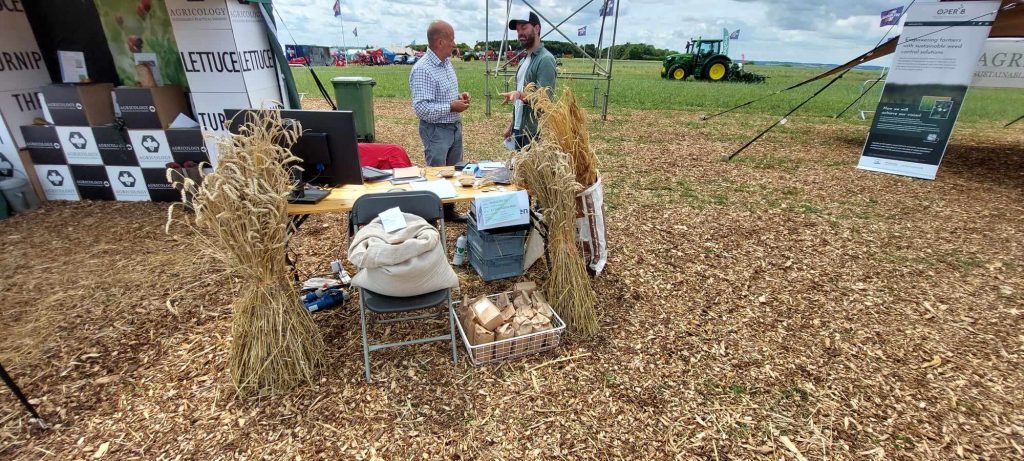
People were treated to a demo of the tool by the Agricology stand (see above). One of the key messages was that to really unlock the true potential of these crops, it needs to be a collaborative approach. Watch the session recording below…
The ‘5 Years Results of Conservation Agriculture Project’ session focused on the results of a long-term trial to help farmers make informed decisions that impact positively on the resilience of their farms. It compared conventional inversion tillage, min till and direct drilling systems. Data was collected on yield, environmental, and climate impacts of transitioning between the different tillage techniques on two sites; a heavy land site at GWCT Allerton Project in Leicestershire and a light land site at Lenham in Kent (with farmer Andy Barr). The trial looked at all aspects of soil health (biological, physical and chemical), and revealed that the largest population of earthworms was seen in the min till plots (with a marked increase in worms that live below ground). How to build up resilience? Firstly, improve soil health.
This is of course a key principle for ‘regenerative agriculture.’ One of the many Groundswell sessions that focused on it was a session organised by Agricology – ‘Making Regenerative Agriculture Pay.’ In it, Clare Hill, farmer and Director of Farming with Nature for New Foundation Farms, suggested that we need to all ask the question “Are we trying to feed the world with calories and volume or are we trying to nourish the world?” This was in response to a question from the audience about yields dropping after moving from more intensive, heavy input farming to adopting more regenerative (and reduced input) farming methods. Clare responded by saying that maybe yields do drop but that can be balanced in various ways – through stacking enterprises for example, and by increasing nutrient density – higher levels of phytochemicals and micronutrients in food are better for us and will improve our health. Diet related diseases are at an all-time high. Promoting healthy soil biology and reducing the use of chemical fertilisers and pesticides can improve the nutrient density of crops.
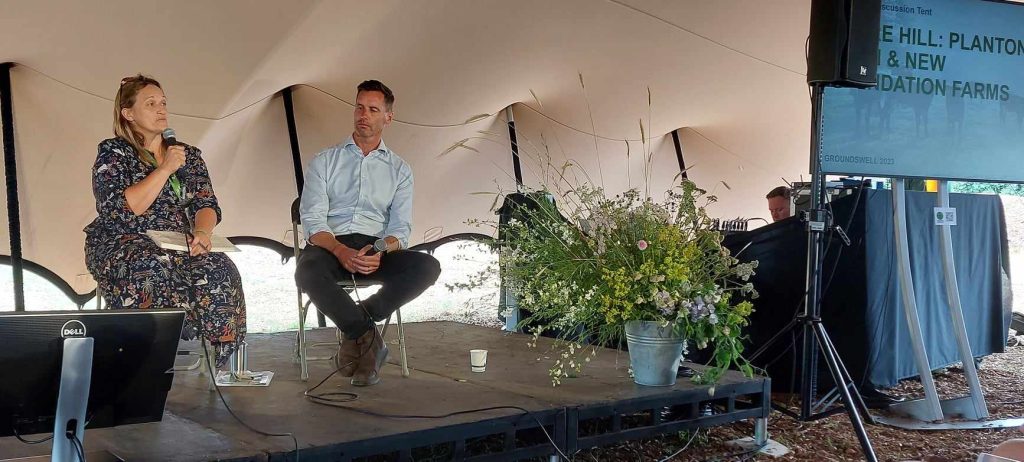
Third generation farmer and co-founder of Oxbury Bank Tim Coates, also on the panel, said “A functional ecosystem is what makes regenerative agriculture pay” and described the various ways he and his team have been working to improve the ecosystem on his farm, including transitioning to being insecticide, plant growth regulator and fungicide free by reintegrating livestock, poly-cropping, and combining a silvoarable system with fruit trees (see below). He also pointed out that “Better ecological farming equals lower financial risk.”
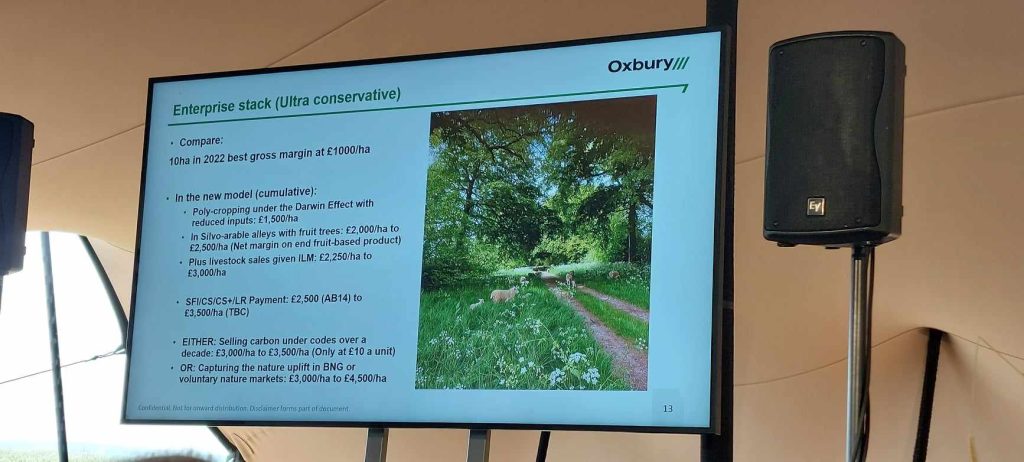
As a member of the audience commented, it is important to remember the human element – “Most of us have been intensive farmers over the decades.” How do we change direction away from yield, yield, yield, and ensure we take people with us who have been used to the old systems? Tim Coates responded by saying he felt it was important to be very open about what you’re trying to achieve – spend time explaining the outcome rather than the process, and make people realise they’re not the only ones going through the transition. It’s about getting the buy-in of us all being in on this journey together.
Third panel member Nick Down, who manages the farm enterprise of the Yattendon Estate, believes a flexible regenerative approach is key, saying that from a financial return and ecological point of view, they want to push everything to the maximum they possibly can. They have 10 -11 crops growing at the moment, are direct drilling (so reducing soil movement), growing cover crops and herbal leys covered by stewardship agreement, bringing livestock back into the system with two neighbouring farmers, and have halved their fuel use in 3 years, which has improved the resilience of their soils. He asked if the general public can afford to pay for a more sustainable product? I think the question that also needs to be asked is can the general public afford not to pay?
A simple message from all the sessions was that change is part of the necessary, and the volume of people who attended and took part in this ‘Glastonbury of the farming world’ (as I heard it referred to as by a few people) was surely testament to that.
